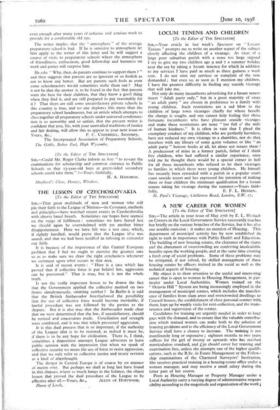THE LESSON OF CZECHOSLOVAKIA
[To the Editor of THE SPECTATOR]
Sta,—That great multitude of men and women who still pin their faith to the League of Nations—its Covenant, methods and principles—have watched recent events in Czechoslovakia with almost bated breath. Sometimes our hopes have seemed on the verge of fulfilment : sometimes we have feared lest we should again be overwhelmed with yet another bitter disappointment. Here we have felt was a test case, which, if rightly handled, would prove that the League idea was sound, and that we had been justified in refusing to surrender our faith.
It is because of the importance of this Central European problem that I feel we ought to exercise the greatest care so as to make sure we draw the right conclusions whenever we comment upon what occurs in that area.
It is said of recent events : " Here is a case which has proved that if collective force is put behind law, aggression can be prevented." That is true, but it is not the whole truth.
Is not the really important lesson to be drawn the fact that the Government applied the collective method on two fronts simultaneously, omitting neither ? In Berlin it is said that the British Ambassador foreshadowed the possibility that the use of collective force would become inevitable, if lawful procedure was not followed by the parties to the dispute. But it is also true that the Ambassador made clear that we were determined that the law, if unsatisfactory, should be revised and concessions made. Conciliation and strength were combined, and it was that which prevented aggression.
It is this dual process that is so important, if the authority of the League idea is to be restored, as indeed it must be, if there is to be any hope for civilisation. There is, I think, sometimes a disposition amongst League advocates to leave public opinion with the impression that when we speak of collective security we mean the use of force to resist aggression, and that we only refer to collective justice and treaty revision as a kind of afterthought.
The danger in Central Europe is of course by no manner of means over. But perhaps we shall at long last have found in this dispute, where so much hangs in the balance, the object lesson that proved the dual procedure of the League to be










































 Previous page
Previous page